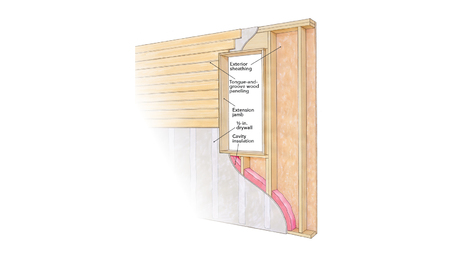Is using a masons mix, literally “masons Mix” ok for a shower pan, on top of the memebrane of course. I have seen guys use sand mix, concrete, even grout….just wondering if masons mix would be ok as well.
thanks
Is using a masons mix, literally “masons Mix” ok for a shower pan, on top of the memebrane of course. I have seen guys use sand mix, concrete, even grout….just wondering if masons mix would be ok as well.
thanks

To prevent moisture buildup and improve performance, install a continuous air barrier—such as drywall or specialized membranes—under tongue-and-groove boards or other interior wall paneling.

"I have learned so much thanks to the searchable articles on the FHB website. I can confidently say that I expect to be a life-long subscriber." - M.K.
Get home building tips, offers, and expert advice in your inbox

Dig into cutting-edge approaches and decades of proven solutions with total access to our experts and tradespeople.
Start Free Trial Now
Get instant access to the latest developments in green building, research, and reports from the field.
Start Free Trial Now
Dig into cutting-edge approaches and decades of proven solutions with total access to our experts and tradespeople.
Start Free Trial NowGet instant access to the latest developments in green building, research, and reports from the field.
Start Free Trial Now© 2025 Active Interest Media. All rights reserved.
Fine Homebuilding receives a commission for items purchased through links on this site, including Amazon Associates and other affiliate advertising programs.
Get home building tips, offers, and expert advice in your inbox
Become a member and get instant access to thousands of videos, how-tos, tool reviews, and design features.
Start Your Free TrialGet complete site access to expert advice, how-to videos, Code Check, and more, plus the print magazine.
Already a member? Log in
Replies
That has no sand in it. Just portland and lime. I think that would be too hard and prone to crack. I've always used something with sand in it. 2:1 sand to mix or something like that.
I batch an area in my yard with a bag, it look good, couple weeks later it crack like crazy, so this weekend replacing. I would just use a bag of portland on the pan
The best employee you can have but you wouldn't want him as a neighbor " He the shifty type"
this masons mix does have sand in it...I think it is for masonry applications. I did one with a sand mix once and it turned out fine...I just got to reading an article in FH about shower pans and the guy called for 4 to one mix (sand/portland). I thought that the sand mix might be to too sandy. So thenI got to double thinking myself and decided to ask the forum...I double think myself alot...its a curse. It handcuffs me.
I hate regrets.
thanks
I use a really stiff sand/portland mix (around 4:1) for the bed under the membrane, but think a less sandy and stronger mix is better to lay the tile on top of the membrane. Maybe 2.5:1 The mason mix I buy is just cement/lime and intended for you to mix in your own sand. If yours has sand in it already, it should probably work fine. You wouldn't actually need the lime. That's more to make it sticky so it works well as mortar. If you have it laying around, I don't see a problem using it. I just buy portland and sand when I need it.
Use the Quickcrete "SAND MIX" if you're using standard Home Depot Stuff. Laticrete makes a nice Thick Bed Mortar Premix I like, if cost isn't a big issue.
Good luck!
Brian
_____________________________
HomeBase
________ Kitchen & Bath Builders, LLC
Brian Roberts, Manager
Even the "Sand Mix" has too much Portland in it. I would go to a Masonry supplier and get "Dry Pack" a mix of 5 to 6 parts sand to 1 part portland. In a pinch, you can use Sand Mix, but use it 2-1 with sand, 2 parts sand to one part Sand Mix.
You really want a surface that is mostly sand and almost no cement. If the sand would stay put, the ideal surface would be in fact, just sand. But it doesn't so you need just a tad of portland cement to hold it together. Cement absorbes water, and when it dries, it shrinks and may crack. Ya'all want a seamless setting bed, with no cracks, humps or dips, all of which will occur with a mainly cement based product.
Regards,
Boris
"Sir, I may be drunk, but you're crazy, and I'll be sober tomorrow" -- WC Fields, "Its a Gift" 1934
Tile suppliers sell 'deck mud' in sacks, and it's mostly sand. You can pack it very tightly by pounding it down with your wood float. It does not 'pour' in any sense of the word, but it does pack so tightly that you can walk on it immediately after packing and not leave an imprint. You can also make it yourself as others are saying at about 5:1, sand:portland. Thing is, you need 'sharp' sand. I've looked at a lot of sand in building materials yard and I never noticed any that was sharp, so I buy deck mud in sacks out of paranoia.
Are you saying that you should use a sand like Silica sand for a better packing than to use masons sand. (the brown stuff)
our mason sand is white
The best employee you can have but you wouldn't want him as a neighbor " He the shifty type"
Dunno. Only term I know is 'sharp' sand, and that's from Michael Byrne's book. Never needed enough to fill my pickup with it, so I buy the deck mud in sacks.